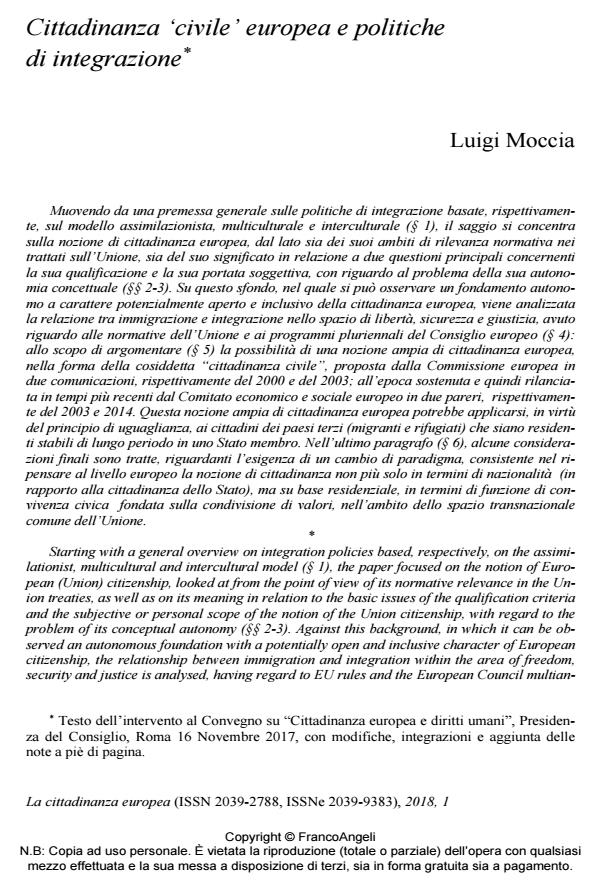Cittadinanza ‘civile’ europea e politiche di integrazione
Journal title CITTADINANZA EUROPEA (LA)
Author/s Luigi Moccia
Publishing Year 2018 Issue 2018/1 Language Italian
Pages 28 P. 5-32 File size 363 KB
DOI 10.3280/CEU2018-001001
DOI is like a bar code for intellectual property: to have more infomation
click here
Below, you can see the article first page
If you want to buy this article in PDF format, you can do it, following the instructions to buy download credits

FrancoAngeli is member of Publishers International Linking Association, Inc (PILA), a not-for-profit association which run the CrossRef service enabling links to and from online scholarly content.
Starting with a general overview on integration policies based, respectively, on the assimilationist, multicultural and intercultural model (§ 1), the paper focused on the notion of European (Union) citizenship, looked at from the point of view of its normative relevance in the Union treaties, as well as on its meaning in relation to the basic issues of the qualification criteria and the subjective or personal scope of the notion of the Union citizenship, with regard to the problem of its conceptual autonomy (§§ 2-3). Against this background, in which it can be observed an autonomous foundation with a potentially open and inclusive character of European citizenship, the relationship between immigration and integration within the area of freedom, security and justice is analysed, having regard to EU rules and the European Council multiannual programmes (§ 4), with an aim to argue (§ 5) the feasibility of a broad definition of European citizenship, in the form of the so-called "civic citizenship" such as proposed by the European Commission in two communications, respectively of 2000 and 2003; then supported and further relaunched in more recent times by the European Economic and Social Committee in two opinions, respectively of 2003 and 2014. This broad notion of European citizenship could apply, in virtue of the principle of equality, to third country nationals (migrants and refugees) who are stable long-term residents in a member state. In the last paragraph (§ 6), some final considerations are made regarding the need of a paradigm shift, consisting in re-thinking at European level the notion of citizenship no longer in terms only of nationality (related to state citizenship), but on a residential basis, in terms of function of civic coexistence grounded on shared values, within the transnational common space of the Union.
Luigi Moccia, Cittadinanza ‘civile’ europea e politiche di integrazione in "CITTADINANZA EUROPEA (LA)" 1/2018, pp 5-32, DOI: 10.3280/CEU2018-001001